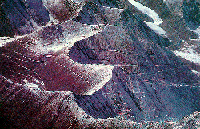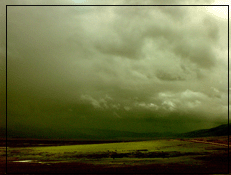|
|
|
|

|
Copyright ©
2000
Qu Le Travel Services
All Rights reserved |
|
|
| |
| SICHUAN -
TIBET HIGHWAY VEHICLE TOUR |
|
| Northern
Section: |
27
days |
| Chengdu |
   |
E'bian |
    |
Ganluo |
   |
Xichang |
   |
|
|
Qiaojia |
    |
LakeLugu |
   |
Kunming |
   |
Dali |
  |
|
|
Lijiang |
    |
Shangri-La |
    |
Benzilan |
 |
Deqing |
  |
2413 kilometers
| Southern
Section: |
13
days |
| Chengdu |
  |
Ya'an |
  |
Kangding |
   |
Litang |
   |
Batang |
   |
Zogong |
 |
Rawu (Raog) |
   |
Nyingtri |
   |
Medro Gongkar |
 |
2161
kilometers
Staring
from Chengdu, at an elevation of 400 meters ,this road goes
over 14 mountains.
The road reaches an elevation of 5000 meters .
 It
crosses 10 large rivers .This
road is truly and engineering feat. The fact that it exists
it exists at all is a marvel,so one shouldn't quibble
about such things as hairping
mountain curves and drop - offs of hundreds of
meters.
Although our drivers on the road makes this route somewhat
dangerous. However, you won't ever, you won't ever see highway
scenery like this, not anywhere. The mountain passes are
truly incredible. It
crosses 10 large rivers .This
road is truly and engineering feat. The fact that it exists
it exists at all is a marvel,so one shouldn't quibble
about such things as hairping
mountain curves and drop - offs of hundreds of
meters.
Although our drivers on the road makes this route somewhat
dangerous. However, you won't ever, you won't ever see highway
scenery like this, not anywhere. The mountain passes are
truly incredible. |
CHENGDU:
Located at the west of
the Sichuan Basin, neighbor to the Qinghai - Tibetan Plateau.
The city with an elevation of 400 meters, has a 2000 year
recorded history and it's site as a settlement probably
goes back another 8000 years at least. It is the economic
center of South-west China. It boasts and International
Airport and is at the center of rail and highway systems
running through the province. Near Chengdu are the Giant
Buddha of Leshan, the Buddhist Mountain of Emei, and the
grasslands of Jiuzhaigou. Three gorges on the Yangtze River
is only about a day to the east. Chengdu is in a region
of life panda bears and ancient dinosaur fossils.
ERLANG MOUNTAIN:
In earlier times, the first natural defense along
the Sichuan - Tibetan Highway, 2200 meters high. The highway
winds around the mountain and crosses Luding Bridge, a chain
bridge over Dadu River finished in 1705. The Red Army took
this bridge in 1935, in an important battle on the Long
March. A memorial statue and museum are on the south side.
HAILOUNGOU:
A glacier on the slope of Snow Mountain, spilling
from 7500 meters down to 2800 meters into a primitive forest
.The ice cataract reaches 1080 meters in height and 500
to 1000 meters in width . The largest in the world.
GONGGA MOUNTAIN:
The main peak of Henduan Mountains, 7556 meters high, 71
glaciers originating here . It's base is 397 square kilometers.
The foot of the mountain is heavily covered by primitive
forest with rich plant and animal resources. There is a
temple on the mountain resources. There is a temple on the
mountain and pilgrims come from afar.
KANDING:
The capital town of Sichuan Ganzhi Tibetan area,
it sits by mountains and rivers and is home to Tibetan Buddhist
colleges.
HAIZHE MOUNTAIN:
A group of lakes on mountains over 4900 meters high.
XINGLUHAI,
QUIRSHAN: The largest glacial lake in
Sichuan,4500 meters above sea level ,2172 square kilometers
in size, the average depth is 10 meters. Quirshan is the
tall peak of West Sichuan, 6318 meters above sea level.
DEGE HOLY
CLASSIC PRINTING INSTITUTE: The largest
Tibetan books and 217,000 blocks of reading woods and 4669
kinds of Tibetan books. The Buddhist classics printed here
are disseminated to the Tibetan area, India, Japan, Nepal,
Southwest Asia and Western Europe.
THE NEWLY
FORMED FAULT BY THE FRESHWATER RIVER: The
most active place of earth crustal movement in Western China.
Many strong earthquakes occurred during this century in
this place . There are earthquake relics in Daofu, Luhuo
along the river, marking the quakes of the 70's.
THE GREAT
CANYON OF YALONG RIVER: A place that contrasts
incredible natural vistas with efficient hydraulic power
stations. One of the largest forest, areas in China, it
has been farmed for 20 years .
JINGSHA
RIVER VALLEY: The
mountainsides along Jingsha River from Ddge to Batang are
littered with broken stones from very recent geological
movement. Mountain formation is still active . Sichuan Tibet
Highway is freqently blocked by mud - rock slides. Baili
Temple in Gangzhi, Babang Temple in Dege, and Gatuo Temple
in Baiyu are famous Buddhist temple in the region.
HENDUANSHAN
MOUNTAINS: These
are a series of mountains through which the highway winds,
Qionglai Mountain, Daliangshan, Daxiueshan, Zheduoshan,
Jinpingshan, Yalongjiang Valley, Shaluh Mountain, Quirshan,
Jingshajiang Valley, Yuenin, Ningjiangshan, Nanchangjian
Valley, Lushan, Taniantawuongshan, Lujiang Valley. All these
mountains and valleys form groups of formations called "two
mountains linked by a river " and " two rivers divided by
a mountain". Henduan Mountains are the products of new formation
movement and modern geological activity. This area is called
the Asian Great Canyon and Geological Museum. The vegetation
of Henduan Mountains are grade -- separated.

Among the thick primitive
forest, there are scattered mountain villages with very
complicated historical backgrounds. The villagers learned
to live on and with the mountains in a struggle for survival
that is adorned with much natural beauty. This area is also
historically significant to the Red Army, which was here
in the 30's and left monuments of their Long March to the
north.
The best
season is from April
to
December.
|
|
| An average
price: |
|
Half
Twin |
Single |
| Northern
section |
|
$2,680 |
$2,860 |
| Southern
section |
|
$2,180 |
$2,380 |
|
|

